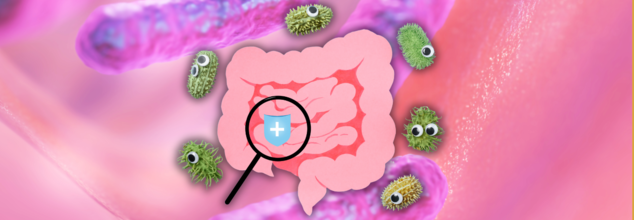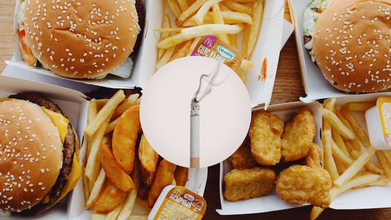- Health Conditions A-Z
- Health & Wellness
- Nutrition
- Fitness
- Health News
- Ayurveda
- Videos
- Medicine A-Z
- Parenting
This Japanese Man Took Probiotic Supplements For Healthy Gut- Weeks Later, He Developed A Fatal Infection

Probiotic supplements promise a healthier gut, but what happens if it become deadly? In a stunning Japanese case, a man's everyday probiotic set off a deadly bloodstream infection. The unusual but disturbing event has raised urgent questions about the safety of probiotics, particularly for people with underlying health issues. Is your gut-friendly supplement a silent danger?
In a rare and unexpected case, a 70-year-old Japanese man developed a deadly bloodstream infection attributed to the very probiotic supplements intended to enhance his health. His case, which was reported in BMJ Case Reports, has sparked serious questions regarding the possible dangers of probiotics, especially for those with weakened health.
The man, who had a history of alcohol dependence and underlying medical conditions, was found collapsed in his home and was rushed to the hospital. Upon examination, doctors diagnosed him with metabolic acidosis—a dangerous buildup of acid in the blood—triggered by a severe lung infection, kidney injury, and possibly heavy alcohol use.
To his list of health issues, the patient tested positive for COVID-19. He was put in the ICU, where he was provided with intensive care, such as breathing assistance, a blood thinner, anti-inflammatory steroids, and tocilizumab—a medication used to suppress inflammatory proteins. In addition to treating a secondary bacterial infection, he was administered antibiotics, which caused diarrhea, a typical side effect.
In an attempt to get his gut health back, doctors prescriped a probiotic with Clostridium butyricum, a naturally occurring bacterium in approximately 20% of healthy people. Although considered safe, the probiotic unexpectedly and fatally turned in his instance.
For nearly two months, the patient appeared to be recovering. However, he suddenly developed severe fatigue, swelling, and persistent abdominal pain. Body scans revealed a life-threatening reduction in blood flow to his intestines—a condition that often results in tissue death and organ failure.
As his health worsened, blood work was done, and an alarming finding was discovered: C. butyricum bacteria were found in his blood. This was a definite indication of probiotic-associated bacteremia—a rare but reported side effect in which bacteria from a probiotic supplement get into the bloodstream and infect the body. Genetic testing proved that the strain in his blood was the same as the one in the probiotic he had been consuming.
In spite of medical treatment, the patient's condition deteriorated quickly. His immune system, already compromised by his medical history of colon cancer, high blood pressure, heart disease, and smoking, could not combat the infection. Because of his unstable status, surgical intervention was not possible. In a matter of days, he had multiorgan failure. With no other medical options available, physicians switched him to palliative care, and he sadly died on the 60th day of hospitalization.
How Might a Probiotic Supplement Become Lethal?
Probiotics are frequently utilized to maintain gut health, particularly following antibiotic use. Probiotics replace beneficial bacteria, enhance digestion, and alleviate inflammation. In rare instances, however, probiotics may break through the gut and enter the blood, causing severe infections. This is more likely in people with compromised immune systems, chronic disease, or underlying gastrointestinal disease.
A number of studies, one of which was released in 2019, have established genetic associations between probiotics and hospital patient bloodstream infections. This case contributes to mounting evidence that while probiotics are generally good for many people, they can be dangerous for susceptible populations.
Who Is Most at Risk?
Though probiotic infections are unusual, some groups are at greater risk, which includes:
- Older patients with multiple comorbidities: As in this case, older patients with comorbidities are at increased risk of developing serious complications.
- Patients with compromised immune systems: Diseases like cancer, chronic kidney disease, and autoimmune diseases raise the risk of infection.
- Critically ill or hospitalized patients: The combination of several treatments, including steroids and immunosuppressive medications, can further increase the risk.
Individuals with gastrointestinal abnormalities: An existing gut problem makes it simpler for probiotics to cross the intestinal barrier and get absorbed into the blood.
Should You Stop Eating Probiotic Supplements?
Even with this unfortunate case, health specialists highlight that probiotics are still safe for most healthy individuals. Nevertheless, they advise using probiotics cautiously, especially in high-risk patients.
Experts point out that although probiotics are prescribed to patients suffering from gastrointestinal conditions, rare but serious side effects can take place. He emphasizes that healthcare practitioners should screen a patient's history before they suggest probiotics, particularly in a hospital setting.
Probiotics are commonly lauded for their shield against colds, digestive problems, and severe health ailments. Their advantages are still controversial, though. A new study conducted by UC San Francisco researchers contradicts the notion that probiotics, in particular the Lactobacillus strain, ward off eczema—a disease commonly associated with asthma.
Probiotics, which exist in supplements and foods that are fermented such as yogurt and kefir, are believed to help promote the health of the gut by enhancing immune function and suppressing disease-causing pathogens. According to the World Health Organization, they are "live microorganisms which, when administered in adequate amounts, confer a health benefit on the host."
Released in Pediatrics on August 7, 2017, the research surveyed high-risk asthma infants. Comparing those supplemented with probiotics for six months to those that were not supplemented, researchers saw no apparent effect that probiotic supplementation has in lowering the risk of eczema, fueling the continued controversy surrounding their actual health effects.
Expert Reveals Why You Keep Gaining Weight Despite Barely Eating

(Photos: Canva)
Recent insights from medical experts show that even people who eat very less can gain weight due muscle mass, stress, and their body’s movement during the day.
Dr Mohit Bhandari, a robotic bariatric and endoscopic weight loss surgeon, founder and director of Mohak Bariatrics and Robotics at Bhandari Hospital Indore notes some people eat whatever they want without gaining weight, while others struggle even with dieting.
The secret lies in the complex interplay of genetics, metabolism, and environmental factors that influence weight management.
This is why are you are putting on weight, according to Dr Bhandari:
1. Metabolism Differences
Studies have shown that metabolic factors are involved in the development of obesity and that being overweight is not simply a result of "sloth and gluttony."The speed at which the body burns calories is different for every individual. A slower metabolism means that even consuming small amount of food can lead to gain.
Individuals with high level of physical activity are less likely to be obese as they mean calories quicker.
2. Hormonal And Lifestyle Factors
Many women experience weight gain during menopause due to a drop in estrogen levels and subsequently fat distribution. This can lead to risk of heart diseases, Type-2 diabetes and joint problems.Hormones like thyroid hormones, cortisol, and play a major role in weight regulation. Stress, lack of sleep and Insulin sensitivity are also factors that lead to fat storage in the body.
3. Loss Of Muscle Mass
When muscle mass decreases due to ageing, inactivity or illness, it often causes a decline in physical activity, which further lowers daily energy expenditure.Consuming a snack rich in carbohydrate with 10-20 grams of protein before and immediately after strength training sessions further acts as a responsible factor in gaining weight.
4. Gut Health And Digestion
Poor digestion can also trigger inflammation, which interferes with blood sugar levels.Additionally, it can also trigger inflammation, which interferes with normal metabolism and insulin function, encouraging fat storage.
Why You Should Be Performing This Exercise Instead Of Lifting Weights

(Photos: Canva)
People are switching from weightlifting and training in the gym to real world strength training.
By strengthening multiple muscle groups at once, it enhances balance, posture, and overall physical efficiency. And one of the best ways to do this is by adopting the farmer's walk
What Is Farmer’s Walk?
Farmer’s Walk is a functional movement that involves picking up weights, maintaining a rigid posture, and walking with controlled steps, mimicking carrying heavy loads in daily life.Here’s Why Farmer’s Walk Has Gained Popularity:
1. Builds Body strength
Carrying heavy weights while walking strengthens the hands, forearms and wrist which directly support grip for other exercises.Meanwhile, the legs including the quadriceps and hamstrings support the lower body’s endurance.
2. Improves Balance And Posture
In terms of balance, carrying loads requires an upright posture. This enhances gait (heel strike of one foot to the next heel strike of that same foot) stability which reduces the chances of injury during weightliftingOverall, this exercise also regulates spinal and musculoskeletal health.
3. Supports Recovery
The Farmer’s Walk is an effective post injury and post-surgery recovery strategy due its scalable nature (weight adjusted to individual’s capacity).It can rebuild strength and stabilize mobility without exceeding tissue healing thresholds.
4. Time Efficient
Furthermore, this exercise provides a full body workout without spending hours in the gym.It can help build strength, improve balance, and boost endurance all at the same time by ensuing coordination among different muscles of the body, making it useful for physical therapy and everyday fitness.
5. Proper Diet and Care It is crucial to fuel your body and make it ready for such a comprehensive exercise.
Proteins such as legumes, tofu and supplements support muscle repair and growth making them an excellent source.
Hydration is the key factor that prevents fatigue and muscle cramps.
Before any extensive workout, warm up thoroughly with light cardio or stretching for about 15-20 minutes.
Treat Ultra Processed Foods More Like Cigarettes Than Food, Says Study

Credits: iStock
Ultra Processed Foods (UPF) should be treated more like cigarettes than foods. A new study by researchers at Harvard, the University of Michigan and Duke University noted that UPFs have more in common with cigarettes than with fruits and vegetables and thus require tighter regulation.
Treat Ultra Processed Foods More Like Cigarettes Than Food: What Did The Study Find Out?
Their findings, published on February 3 in the healthcare journal Milbank Quarterly, suggest that both industries have historically engineered products to maximize consumption and potentially drive addiction-like behaviors.
According to the researchers, both cigarettes and ultra-processed foods are developed using similar strategies aimed at influencing reward pathways in the brain. The study suggests manufacturers carefully calibrate ingredients to optimize the “dose” of sugar, fat or salt, ensuring rapid sensory satisfaction that encourages repeated consumption.
The paper draws from addiction science, nutrition research and public health history to highlight these overlaps. The authors concluded that many UPFs demonstrate behavioral and consumption patterns that resemble addictive substances, even if they differ biologically from tobacco.
Professor Ashley Gearhardt, a clinical psychologist at the University of Michigan and one of the study’s authors, said she often hears patients describe their eating patterns in language similar to addiction. She explained that many individuals report intense cravings for products like soda and sugary snacks, acknowledging their health risks but finding it difficult to stop consuming them.
Treat Ultra Processed Foods More Like Cigarettes Than Food: What Are UPFs?
UPFs refer to food products that are heavily industrially manufactured using ingredients rarely found in home kitchens. These often include additives such as emulsifiers, artificial flavors, preservatives and coloring agents. Common examples include sugary soft drinks, packaged snacks, biscuits, instant meals and processed meats.
Unlike minimally processed foods such as fruits or vegetables, UPFs are typically designed for longer shelf life, convenience and enhanced taste appeal.
Read: Ultra-Processed Foods May Add 330 Extra Calories A Day, Study Finds
Treat Ultra Processed Foods More Like Cigarettes Than Food: The Role Of Marketing And “Health Washing”
The researchers also examined marketing strategies used by food companies. They argue that claims such as “low fat” or “sugar free” may create a perception of health benefits while distracting from overall nutritional quality. The study compares this tactic to cigarette advertising in the 1950s, when filters were promoted as safety innovations despite offering limited protection.
The authors believe such marketing can delay regulatory action by creating confusion among consumers and policymakers.
While tobacco is not essential for survival, food is a basic human necessity, making regulation far more complex. However, Professor Gearhardt noted that it should still be possible to distinguish between potentially harmful ultra-processed foods and healthier dietary options, much like alcoholic beverages are regulated differently from other drinks.
The researchers argue that UPFs meet several established criteria used to identify addictive substances, including product designs that may encourage compulsive consumption. Regardless of whether UPFs qualify as addictive in a strict scientific sense, the authors emphasize that their link to rising health problems remains well documented.
The study recommends adopting strategies similar to tobacco control measures, including stricter marketing regulations, industry accountability and structural public health interventions.
However, not all experts fully agree with the comparison. Professor Martin Warren, chief scientific officer at the Quadram Institute, acknowledged parallels but cautioned against drawing direct equivalence between nicotine addiction and UPF consumption. He suggested that it remains unclear whether UPFs are chemically addictive or whether they primarily exploit behavioral preferences and convenience.
Professor Warren also noted that health risks associated with UPFs may partly stem from their replacement of nutrient-rich whole foods.
A Growing Global Concern
Dr Githinji Gitahi, chief executive of Amref Health Africa, warned that the expansion of ultra-processed food markets, especially in regions with weaker regulatory systems, is placing additional strain on public health infrastructure. He emphasized that without stronger government-led interventions, the rising burden of non-communicable diseases could overwhelm healthcare systems.
As research continues to explore the long-term health effects of ultra-processed foods, the debate highlights a larger question: whether modern food environments are shaping consumer choices in ways that demand stronger regulatory oversight.
© 2024 Bennett, Coleman & Company Limited

